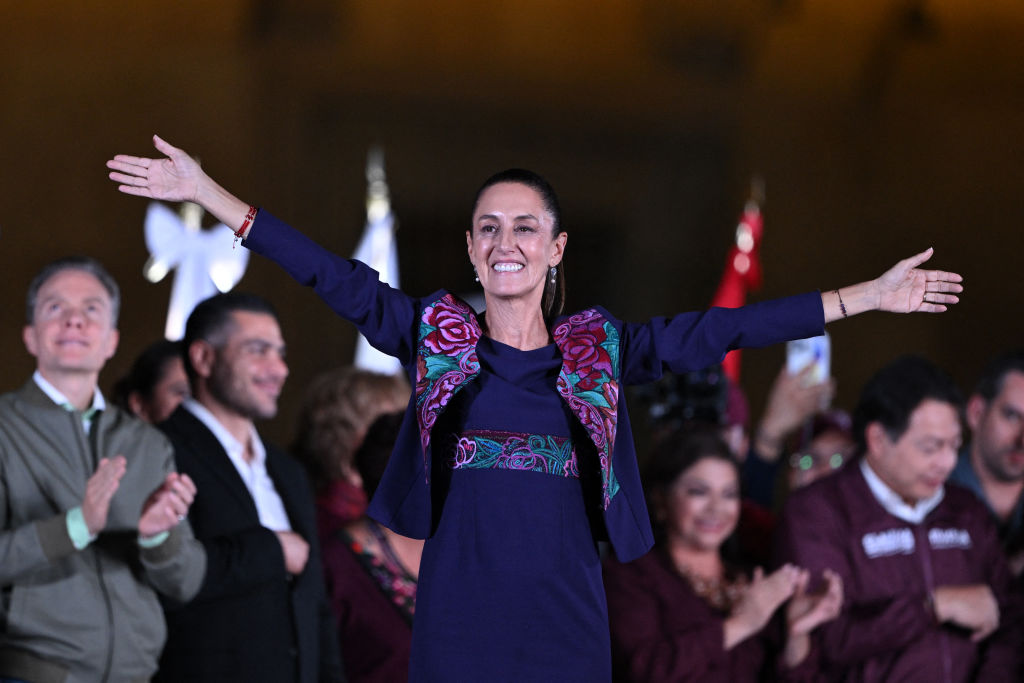Mexico has elected its first female president, with preliminary results showing former Mexico City mayor Claudia Sheinbaum victorious. According to Quick Count, an exercise that the National Electoral Institute produces based on statistical samples from various polling stations, Sheinbaum won with 58-61 percent of the vote.
The sixty-one-year-old will also become the first Jewish leader elected in the overwhelmingly Catholic country, as well as possibly the one that has won by the widest margin. She is now doubling her lead over Xóchitl Gálvez, who was backed by a coalition of the National Action (PAN), Institutional Revolutionary (PRI) and Democratic Revolution (PRD) parties.
The win solidifies the shift that former president Andrés Manuel López Obrador began. Before his rise with the anti-neoliberal and populist Movement for National Regeneration (Morena) Party, Mexican politics were dominated by the PRI, which governed for over seventy years since its founding in 1929, and PAN, the main opposition party that started winning national elections by the beginning of the twenty-first century. By defeating an “establishment coalition,” Morena has permanently changed the nation’s politics — imagine an independent Bernie Sanders or Donald Trump defeating a Republican-Democrat coalition.
Sheinbaum’s background is quite unorthodox. Known as “La Doctora” (the doctor), she is a physicist who was part of a United Nations panel of climate scientists that received a Nobel Peace Prize in 2007. Unlike AMLO, who catapulted her into the political sphere when he appointed her as his environment secretary after becoming Mexico City’s mayor in 2000, Sheinbaum is herself more of a big city academic rather than a modest-backgrounded machine politician.
She has all the right ideas yet they come differently packaged, in stark contrast to what has been traditionally observed in Latin America. Venezuela’s Hugo Chávez, Bolivia’s Evo Morales, AMLO and many others have risen with a common formula — bombastic speeches and a familiar message: “I’m one of you, I’ll fight for the poor.”
Sheinbaum does not fit that mold. In a way, she is more equivalent to a pampered elite-college-educated progressive American, who participated in all the protests, yet ended up marrying a Goldman Sachs analyst. Her husband, Jesús María Tarriba, is a financial risk specialist at the Bank of Mexico. Her mother, Annie Pardo Cemo, is a professor emeritus of the Faculty of Sciences at the National Autonomous University of Mexico, and her father, Carlos Sheinbaum Yoselevitz, was a chemical engineer.
With AMLO by her side, Sheinbaum seems uncharismatic, the type of person who you’d expect moving the levers, not knocking on doors. After all, she is a scientist, a wonk, a technocrat. She resembles a more conventional progressivism, one that Americans will likely have an easier time digesting. While AMLO uses religious rhetoric to rail against the elites, Sheinbaum, in part instructed by her upbringing, is likelier to keep things secular. There is a common misunderstanding in the US that places Latin American “left-wingers” in the same category than American ones, yet a deeper examination of AMLO’s presidency reveals that he often governed like a social conservative, single-handily blocking the legalization of marijuana, for example. Sheinbaum, such as Chile’s Gabriel Boric (whose dad was also a chemical engineer!), are exceptions to the rule, denoting the rise of what one could conceive of as a more Americanized regional left.
It was Sheinbaum’s distinctive background and riding AMLO’s coattails that led to such an outstanding victory. From the Zócalo, the biggest square in Mexico and the second biggest in the world, Sheinbaum credited her predecessor, celebrating the successes of his sexenio (Mexico’s signature six-year, non-renewable presidential term). “It’s an honor being with Obrador,” Sheinbaum chanted with the crowd.
Despite AMLO’s unpopularity with Mexico’s northern neighbor’s government officials and journalists, there are economic indicators that make sense of why his platform appears electorally irresistible. What some see as a narco-enabling, democracy-destabilizing figure has undeniably been a champion for the country’s working class. As Compact’s Juan David Rojas points out, “Unemployment hit a record low of 2.5 percent in 2024, while energy prices rose just 0.1 percent in 2023, despite a global energy crisis. Between 2018 and 2022, the share of Mexicans living below the poverty line fell to 36 percent, down from 42 percent, and has almost certainly declined further since then.”
Responding to accusations of enabling what is set to become a shadow presidency, AMLO said, “Let it be heard loud and clear, after I finish my term in office, I will retire and I will never again participate in any public or political act.”
For the United States, it’s still unclear how much the new executive will change dynamics. Superficially, it might seem like with a new face, negotiations regarding migration and trade may benefit the US. Sheinbaum’s rhetoric and background are more in congruence with the type of leaders the US government usually gets along with. Yet with claims of becoming her own president and continuing AMLO’s legacy, things remain murky.


























Leave a Reply